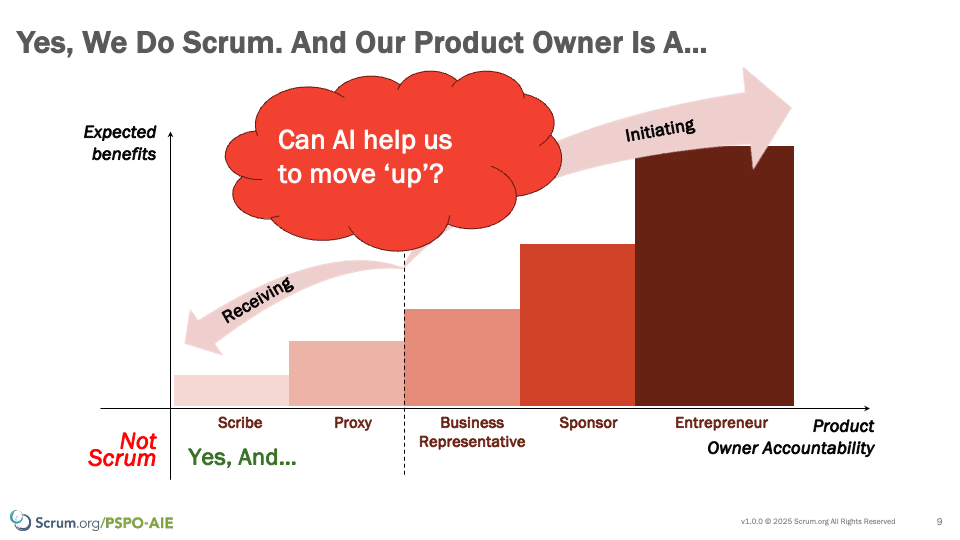AI is transforming product management. For Product Owners, it’s not just a trend but a necessary skill that is already part of their daily reality. To navigate this shift, a new stance emerges: the Orchestrator.
As Robbin Schuurman describes here, Product Owners move fluidly between six preferred stances, each offering a different lens and skillset. The Orchestrator builds on this foundation, offering a way to integrate AI into the Product Owner’s toolbox.
The Orchestrator stance is not about replacing human judgment. Instead, it treats AI as a colleague, a digital team member that can automate repetitive tasks, reduce cognitive load, and free up time for meaningful work. This helps Product Owners step away from the “scribe” or “proxy” role and reclaim their focus on impact and value.

What does it mean to be an Orchestrator?
Product Owners often find themselves consumed by operational tasks: logging feedback, preparing stakeholder updates, summarizing conversations, and answering recurring questions. These activities are necessary, but they rarely create the highest value.
The Orchestrator stance invites Product Owners to delegate such repeatable tasks to AI. Much like a conductor in an orchestra, the Product Owner doesn’t play every instrument. Instead, they create harmony, guiding the rhythm, aligning the players, and keeping everyone focused on the overall performance.
Why this stance matters
Adopting the Orchestrator stance allows Product Owners to:
Free up time and focus : AI handles routine work, creating space for vision-building and decision-making.
Enable flow : smooth coordination without the Product Owner becoming a bottleneck. (I once had a student who was the Product Owner for seven teams; no wonder they felt overwhelmed!)
Concentrate on high-value work : Product Goals, market insights, current business conditions, stakeholder alignment, and strategy.
While AI can support Product Owners in every step of their Product Owner journey, the biggest impact is seen with the “clerk” and “scribe” types of Product Ownership, those stuck managing the backlog, writing user stories all day, and saying “yes, we’ll add it to the backlog” by default. For them, AI can be a real game-changer.
“POs who orchestrate with AI free up time for the meaningful work: vision, collaboration, customer insights.”
Putting orchestration into practice: amplifying every PO Stance with AI
The Orchestrator isn’t a separate role; it’s a powerful lens that amplifies all other Product Owner stances. By delegating routine tasks to AI, Product Owners create more bandwidth to excel as:
The Visionary: Explaining the product vision, future state, and goals. AI can help craft clear narratives and generate compelling visuals (images and video).
The Collaborator: Gathering input, ideas, and feedback. AI tools can collect, process, and synthesize stakeholder perspectives.
The Customer Representative: Understanding customer pains and opportunities. AI can analyze surveys, reviews, and feedback to build personas.
The Decision Maker: Making clear, evidence-based choices. AI can support prioritization by surfacing patterns and data-driven insights.
The Experimenter: Driving innovation and learning. AI can accelerate prototyping, generate experiments, and highlight signals in the data.
The Influencer: Inspiring and aligning stakeholders, customers, and the Scrum Team. AI can support communication strategies and help craft persuasive content.
And finally, the Orchestrator: using AI to automate the hundreds of small, routine tasks that quietly drain time and energy.
By doing so, Product Owners reclaim space for the work that truly matters.
Mindset Shift
By delegating routine tasks to AI, the Product Owner as Orchestrator reclaims valuable time and mental energy. This allows them to focus on the strategic, creative, and human-centered aspects of their accountability. In this way, AI amplifies, not replaces, the Product Owner’s impact.
The Orchestrator stance is above all a mindset shift. It means moving from doing everything yourself to orchestrating how the work gets done.
This requires three principles:
Trust AI with low-risk, repeatable tasks.
Stay accountable for product quality and outcomes.
Invest freed-up time into leadership, collaboration, and strategy.
Key Takeaways
- Reduce cognitive load: The Orchestrator stance frees Product Owners from repetitive tasks.
- Amplify with AI: Treat AI as a digital assistant for operational work.
- Shift the focus: From doing everything yourself to ensuring everything is done well.
- Stay accountable: Product Owners lead with clarity, intent, and responsibility.
Professional Scrum Product Owner AI Essentials
The Orchestrator stance is a central theme in the Professional Scrum Product Owner – AI Essentials (PSPO-AI Essentials) course. This training equips Product Owners to integrate AI responsibly and effectively into their practice, enabling them to deliver greater value in a rapidly changing landscape.
In the course, we go beyond ChatGPT and explore a variety of tools that can support Product Owners. We connect these tools to three of the five levels of AI implementation:
Prompting — using AI for productivity and creativity.
Automation — embedding AI into workflows and repeatable tasks.
Application — purpose-built AI features solving business problems.
(The more advanced levels — Agentic AI and Fully Agentic Systems — are not part of this class yet, but they are on the horizon.)
We also use the POWERS framework for effective prompting, because the better the prompt, the better the result.
And we don’t stop at tools: participants design an AI feature for their own product. This way, they learn to move beyond “playing with tools” and start exploring how AI can create value in their specific context.
How might you start orchestrating with AI in your own product work?
Curious to learn more? You can find my upcoming PSPO-AI Essentials trainings here.


